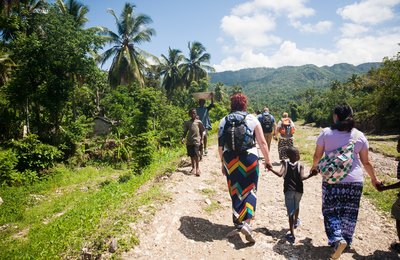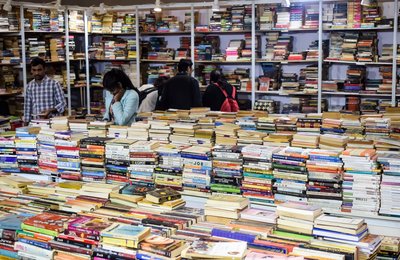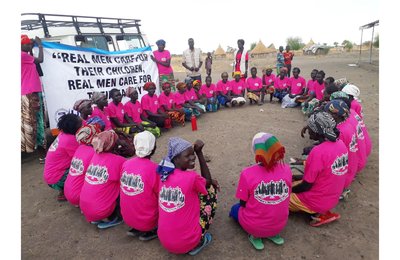
The Yugoslav tragedy, however, did not end with the termination of war in BiH, but was perpetuated by the escalation of armed conflict in Kosovo and NATO's aggressive military intervention against Serbia. All the while, Macedonia kept its borders open and provided shelter for around 300,000 Albanian refugees from Kosovo. And just when it seemed that all the wars were finally over, in 2001 Macedonia itself was caught-up in armed insurgency, with its Albanian minority demanding greater autonomy and rights.
The need for peace education

From Village Međaši to The First Children's Embassy Megjashi in Macedonia
Geographically located in Bosnia and Herzegovina, in a triangle where the three dominant religions in the Balkans – Islam, Catholicism and Orthodox Christianity, respectively – meet, the territory of some 30,000 m2 in the village Međaši was in June 1991 declared the first "children's country" in the world. In April 1992, as war was engulfing BiH, the First Children Embassy in the World Megjashi was established in Macedonia, by Mrs. Gordana Pirkovska-Zmijanac, her husband, Mr. Dragi Zmijanac, and a group of prominent personalities. At first, their primary concern was the plight of refugee children from BiH. As their activities became publicly-acknowledged, they soon realised that there was a great need to also work on protecting the rights of children in Macedonia. The first step was the SOS helpline for children and young people, followed by free legal advice, personal counselling, a number of creative workshops, a friendship centre, and more. What concerns them most at present, however, is the latest spate of inter-ethnic violence in Macedonia, threatening personal safety and security of children and undermining any vision of a joint future.For further information, please visit: http://www.childrensembassy.org.mk
In April 2011, Megjashi started implementing its peace education programme, in partnership with the German NGO, Kurve Wustrow – Centre for Training and Networking in Nonviolent Action, and with the support of the German Federal Ministry for Economic Cooperation and Development (BMZ), within the frame of the Civil Peace Service Programme.
The programme aimed “to promote non-violence and peace culture as the core values of Macedonian society and to effect the adoption of peace education into the formal educational system.” The peace education project evolved from Megjashi's earliest and most highly acclaimed multi-cultural clubs in high-schools around Macedonia in 2003-2004, with the aim of fostering communication between different ethnic groups.
Kurve Wustrow's role throughout the peace education programme – which will run until 2015 – is to provide guidance and develop Megjashi’s capacity; whilst Megjashi's experience and understanding of the particular traits of inter-ethnic conflicts in Macedonia has been an invaluable asset in determining and planning project activities. According to Sebastian Schweitzer, a German civil peace worker engaged on the project:
This form of cooperation is very important, as we wanted to avoid externally-imposed, ready-made solutions. Instead, the project is envisaged as locally/nationally-owned and one of its key benefits is that it is a learning process for both Megjashi and the German partner. Our key objective is to use synergy drawn from professional backgrounds and experience of both organisations, respectively, which should enable us all to realise sustainable peacebuilding programmes with lasting change in those societies afflicted by conflicts. Another important element is capacity development of Megjashi which should enable them to continue their peace education programme beyond given time-frame of our cooperation

- Mono-ethnic: primarily attended by ethnic Macedonians and other 'small' minorities (Serbs, Roma, Bosniaks, Turks, Croats);
- Two schools under one roof: which in this case is a high-school for medical education divided between Macedonian and Albanian students; and
- Two schools under one roof, plus one school predominantly attended by Macedonians and a smaller minority groups: This last school had received negative publicity due to an incident in spring 2011 when an Albanian student was brutally murdered by another Albanian because he tried to defend a Macedonian schoolmate.
The advantage of this approach is that it is school-tailored, specifically adjusted to suit every individual school. The greatest challenge is that no structure is strictly defined; instead, it is the responsibility of the teachers and educators. In order to alleviate such a daunting undertaking, a team of external trainers have been tasked to mentor school clubs, and to help teachers and peace educators improve the quality of the training methodology and education.
The next stage will be the development of a model of peace education, which would be implemented in three schools outside Skopje, followed by evaluation of its overall impact. Subsequently, a proposal will be presented to the Macedonian Ministry of Education for the curriculum to be incorporated into mainstream education.
According to Gordana Pirkovska Zmijanac, co-founder of Megjashi:
The ultimate objective is to instil and develop a culture of peace, since violence is increasingly more manifest in schools in Macedonia. I believe that by introducing peace education into the official curriculum, a significant step would be made in preventing youth violence. Hardly a day passes without violence in schools; our children are not safe. Whilst the state is indeed endeavouring to provide basic security - i.e. securing a policeman per school - that in itself is not a promotion of peace, non-violence and peaceful conflict resolution, which in fact is crucially important for multi-ethnic schools. Therefore, peace education would guarantee early prevention and a decrease of violence through a gradual change of prevalent attitudes and behaviours, as well as through requisite skills for conflict transformation and positive social interaction.Gordana also emphasised that:
Whilst we do have civic education, with certain elements of peace education integrated therein, I still find that insufficient. Peace education must not be equated with human rights or political education, because it is based on the prevention of violence and of potential conflicts. It is the fact that exactly there, i.e. in the realm of prevention, schools lack adequate activities for conflict prevention, which often results in the breakdown of communication between young people of different ethnic backgrounds burdened by prejudices and stereotypes, and often resorting to verbal and physical violence, frequently with grave consequences.Sebastian adds:
For me personally, this is a unique opportunity to be directly involved in a peacebuilding project aimed at fostering structural change in Macedonian educational system, which will replace existing – often violent – patterns of conflict resolution with an approach based on a culture of peace. Working with my Macedonian colleagues is a continuous learning process about Macedonia, the Western Balkans and peacebuilding in general. Through planning process, we started a common path of mutual learning which helped us to understand what peace-building and international cooperation is really about.Integrated effort, expertise and experience will hopefully bear fruit, with the incorporation of peace education in Macedonia ultimately serving as a positive example for the entire region.










